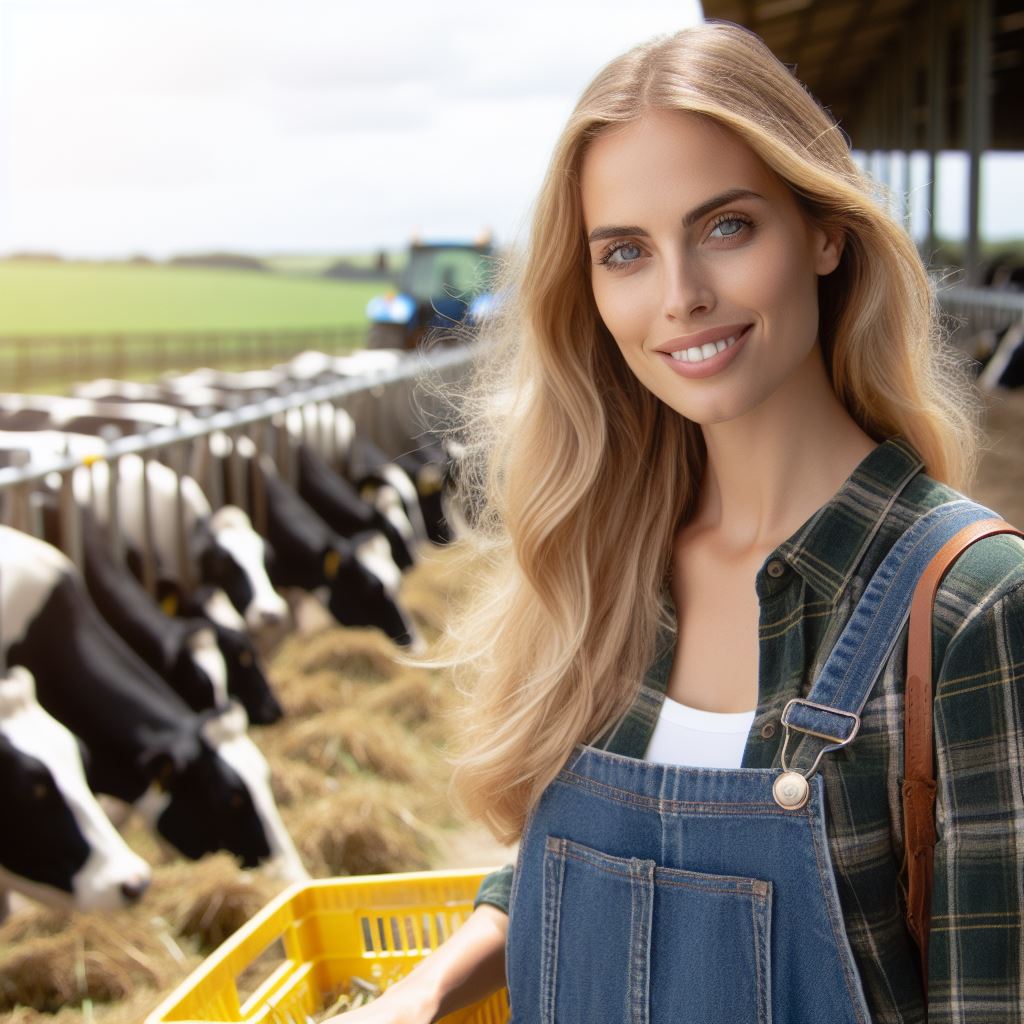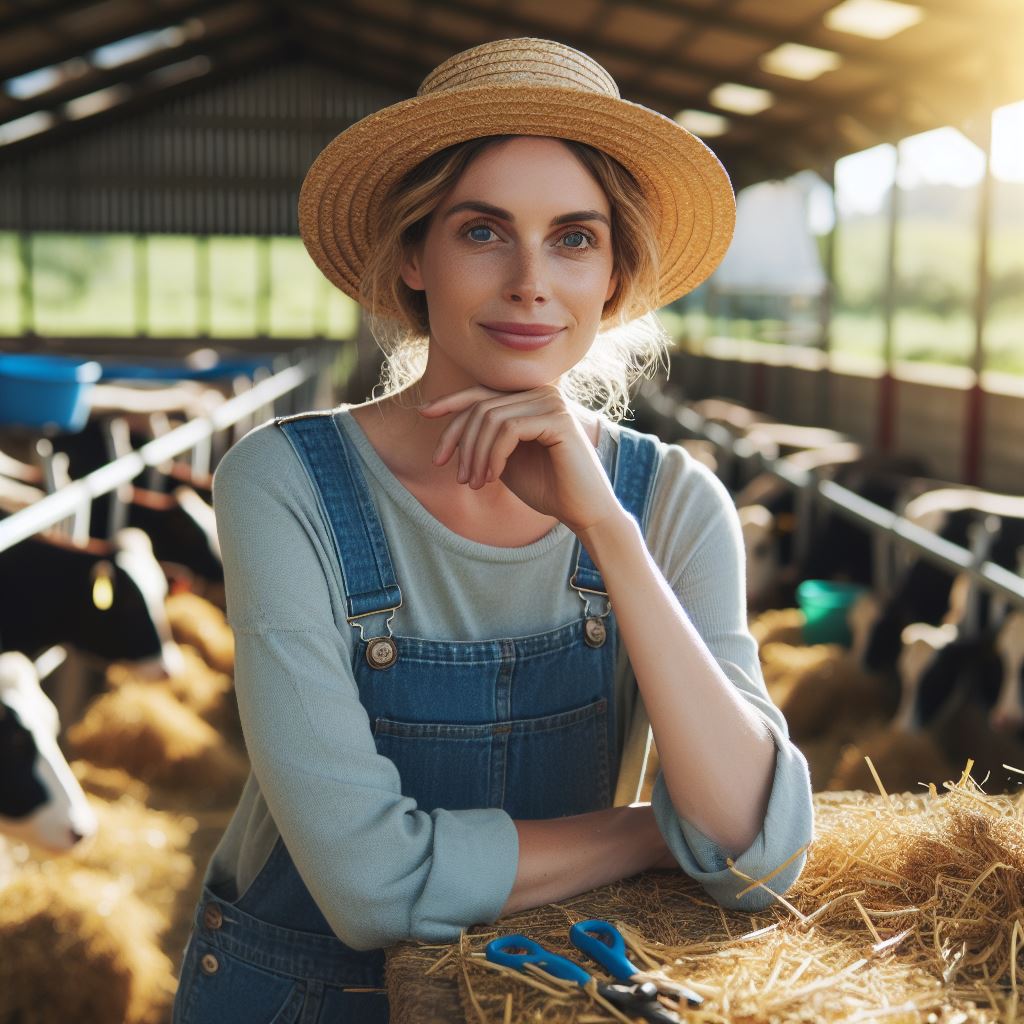Introduction
In this blog post, we will explore the challenges and rewards of UK farming.
UK farming faces numerous obstacles, but it also offers great benefits to those involved.
Let’s delve into the intricacies of this dynamic and important industry.
Challenges
- The uncertainty of Brexit and its potential impact on farming subsidies and trade agreements.
- Climate change poses a significant challenge as extreme weather events become more frequent.
- Rising costs of inputs like feed, fertilizers, and fuel squeeze farmers’ margins.
- The aging farming population and a lack of interest in agricultural careers hinder the industry’s growth.
- The struggle to meet increasing food demands while maintaining sustainable farming practices.
Rewards
- UK farmers contribute to the country’s food security and reduce reliance on imports.
- Farming provides rural employment opportunities, supporting local economies.
- The satisfaction of nurturing and caring for livestock and crops, seeing them thrive and flourish.
- Connecting with nature and enjoying the serene beauty of the countryside.
- The possibility of diversification into agritourism, farm shops, or renewable energy production.
Despite the challenges, UK farming remains a vital industry, providing food, generating jobs, and supporting communities.
By recognizing the rewards and working collaboratively, farmers can overcome obstacles and ensure a sustainable future for UK agriculture.
Overview of UK farming
The agricultural sector in the UK plays a vital role in the country’s economy.
Farming holds great significance due to various factors such as food production, employment, and environmental impact.
Food Production
UK farming is responsible for producing a significant proportion of the country’s food supply.
The sector cultivates a wide range of crops, including grains, fruits, vegetables, and livestock farming.
Additionally, it ensures a steady supply of dairy and poultry products, contributing to a diverse and sustainable food system.
Employment opportunities
Farming in the UK provides substantial employment opportunities for both skilled and unskilled workers.
It supports rural communities by offering jobs in various agricultural activities like planting, harvesting, and animal husbandry.
Moreover, the sector also generates employment in associated industries such as food processing and distribution.
Economic contribution
The UK farming sector contributes significantly to the country’s economy.
It generates revenue through the sale of agricultural products domestically and internationally.
Exports of British agricultural goods, including meat, dairy, and crops, boost the country’s trade balance and stimulate economic growth.
Furthermore, farming supports related industries, such as manufacturing farm equipment and agricultural services, enhancing economic activity.
Environmental impact
UK farming plays a crucial role in preserving and improving the environment.
Farmers employ sustainable practices to maintain biodiversity, manage soil health, and reduce greenhouse gas emissions.
Agricultural practices aimed at conserving water, protecting wildlife habitats, and promoting ecological balance contribute to a greener future.
Moreover, the sector actively participates in initiatives to mitigate climate change and promote sustainable land management.
Challenges faced by UK farming
Despite its significance, the UK farming sector faces various challenges.
Fluctuating weather patterns, including droughts and floods, can adversely affect crop yields and livestock production.
Additionally, price volatility in global food markets impacts farmer incomes, making it difficult to sustain profitable operations.
Furthermore, changing government policies, such as post-Brexit agricultural reforms, bring uncertainties and challenges for farmers.
Rewards of UK farming
While challenges exist, UK farming also offers several rewards.
Farmers experience the satisfaction of contributing to national food security and supporting local communities.
The connection with nature and the opportunity to work on the land attract individuals to pursue a farming career.
Moreover, technological advancements and innovation in the sector provide opportunities to improve productivity and profitability.
In essence, UK farming plays a significant role in the country’s economy, food production, employment, and environmental sustainability.
It faces challenges related to weather, market volatility, and policy changes, but these are balanced by the rewards of food security, community support, and a connection to nature.
Government support, technological innovation, and sustainable practices will be crucial in ensuring the long-term success of UK farming.
Read: Aquaculture in the UK: Education Pathways
Challenges Faced by UK Farmers
Being a farmer in the UK comes with its fair share of challenges.
From the impact of climate change on farming practices to the difficulties in dealing with unpredictable weather patterns, farmers must navigate various obstacles to keep their businesses thriving.
Impact of Climate Change
Climate change has had a significant impact on farming practices in the UK.
Farmers now face shifting weather patterns, including more frequent extreme weather events like floods and droughts. They must adapt their methods to these changes to maintain productivity.
Dealing with Unpredictable Weather Patterns
The UK is known for its unpredictable weather, and this poses a considerable challenge for farmers. Sudden changes in temperature, rainfall, or wind can greatly affect crop yields or livestock health.
Constant monitoring and quick adaptations are necessary to mitigate the risks.
Competition from Foreign Imports
UK farmers also face tough competition from foreign imports. Imported produce often comes at a lower cost, making it difficult for UK farmers to compete in terms of pricing.
This can put a strain on the profitability of domestic farming operations.
Personalized UK Career Consulting
Receive tailored career guidance designed just for you. Get actionable steps and expert support to boost your career in 1-3 days. Take control of your career now.
Get StartedIssue of Land Availability and Rising Costs
As urban areas expand and population increases, the availability of agricultural land becomes more limited. Farmers face pressure to either maximize their current land or find alternative solutions.
Additionally, rising costs of land rental or purchase pose financial challenges for both new and established farmers.
Meeting Food Safety Standards and Regulations
Ensuring food safety standards and compliance with regulations is crucial for farmers in the UK.
The complexity and constant changes in regulations require farmers to stay updated and invest time and resources.
Meeting these standards while keeping the farming business economically viable can be demanding.
Despite these challenges, farming in the UK also offers rewards and opportunities. The following section will shed light on the rewards that come with persevering in this industry.
Read: Sustainable Practices in UK Aquaculture Tech

Explore Further: Sustainable Forestry: UK Case Studies
Rewards of UK farming
In the heart of the British countryside, farmers reap the rewards of their labor with unbridled satisfaction.
A thriving agricultural sector yields not just crops but a multitude of benefits that resonate across the nation.
- Sustainable Prosperity: Through innovative farming practices, UK agriculture contributes to economic stability, fostering a sustainable and resilient financial landscape.
- Culinary Riches: From the verdant fields arise a cornucopia of fresh, local produce, enriching the nation’s culinary scene with flavors that captivate the taste buds.
- Job Creation: Fields teem with life, providing employment opportunities that extend far beyond planting and harvesting, creating a robust job market in rural areas.
Sustainable - Environmental Stewardship: Farmers champion conservation efforts, safeguarding biodiversity, and implementing eco-friendly practices that protect the delicate balance of the ecosystem.
- Community Bonds: The farming community weaves a tight-knit fabric, fostering social connections and preserving traditions that have stood the test of time.
- Global Standing: Internationally, UK farming stands as a symbol of agricultural excellence, promoting the nation’s reputation as a leader in sustainable food production.
- Health and Well-being: The bounty of fresh, nutritious produce promotes a healthier populace, reducing reliance on imported goods and cultivating a self-sufficient society.
- Educational Nexus: Farms become open-air classrooms, imparting valuable lessons about food origins, sustainability, and the interconnectedness of nature.
In this agrarian tapestry, the rewards of UK farming extend far beyond the fields, intertwining with the fabric of national prosperity and well-being.
Read: UK Aquaculture Technician: Career FAQs
Success stories in UK farming
- John Smith: transformed his small farm into a thriving organic vegetable business.
- Strategies employed: diversification into value-added products, direct marketing to local communities.
- James Thompson: implemented precision farming techniques to improve crop yields and reduce environmental impact.
- Strategies employed: use of satellite imagery and sensors to optimize fertilizer and water application.
- Sarah Adams: successfully started a free-range poultry farm, supplying local restaurants and farmers’ markets.
- Strategies employed: focusing on high-quality, ethically sourced products and building strong relationships with customers.
These success stories in UK farming highlight the various strategies adopted by farmers to overcome challenges and achieve success in their respective fields.
Innovative and sustainable farming practices
- John Smith adopted sustainable practices by using organic farming methods, avoiding synthetic pesticides and fertilizers.
- James Thompson’s precision farming techniques minimize the use of resources, reducing waste and pollution.
- Sarah Adams’ free-range poultry farm promotes animal welfare and provides customers with ethically sourced products.
These innovative and sustainable farming practices not only benefit the environment but also contribute to the success of these farmers.
The success of these farmers can be attributed to their dedication, hard work, and ability to adapt to changing market demands.
By diversifying their farm operations, implementing advanced techniques, and adopting sustainable practices, they have overcome various challenges and achieved significant success.
John Smith’s transformation from a small farm to a thriving organic vegetable business showcases the importance of diversification and direct marketing.
By offering value-added products such as pre-packaged salads and vegetable boxes, he has created a loyal customer base and has been able to maintain a steady income throughout the year.
James Thompson’s successful implementation of precision farming techniques demonstrates the potential of technology in modern agriculture.
By using satellite imagery and sensors, he optimizes crop inputs, resulting in increased yields, reduced environmental impact, and improved profitability.
Sarah Adams’ free-range poultry farm is not only a successful business but also contributes to sustainable farming practices.
By prioritizing animal welfare and offering ethically sourced products, she has gained the trust of customers who value quality and environmentally friendly options.
Your Dream Job Starts with a Perfect CV
Get a tailored CV and cover letter that captures your unique strengths and stands out in your industry. Let us help you make an unforgettable first impression.
Get StartedThese success stories and innovative practices serve as inspiration for other farmers who are facing challenges in the UK agricultural industry.
The agriculture sector is constantly evolving, and it is essential for farmers to embrace change, incorporate new technologies, and adopt sustainable practices to thrive in a competitive market.
Read: Aquatic Health Management by UK Experts
Gain More Insights: Tech in Agriculture: UK Manager’s Toolkit
Conclusion
UK farming faces numerous challenges such as climate change, economic uncertainties, and Brexit implications.
However, the rewards of farming are significant, including providing food security, preserving rural communities, and promoting sustainable land management.
It is crucial to support UK farmers and their efforts to overcome these challenges.
By buying locally sourced products, we can contribute to the growth of local economies and reduce carbon emissions associated with long-distance transportation.
Additionally, supporting sustainable farming practices is vital for the well-being of the environment and future generations.
It promotes biodiversity, reduces chemical usage, and ensures the long-term viability of agricultural lands.
To make a positive impact, we should educate ourselves about where our food comes from and the challenges farmers face.
Learning about sustainable farming practices and supporting initiatives that promote responsible land management can help us make informed choices and contribute to a more sustainable future.
Together, we can create a thriving agricultural sector in the UK. By understanding the challenges and rewards of farming, we can appreciate the hard work and dedication of our farmers.
Let us celebrate them by choosing locally sourced products and supporting sustainable farming practices.
[E-Book for Sale]
500 Cutting-Edge Tech Startup Ideas for 2024 & 2025: Innovate, Create, Dominate
$19.99 • 500 Tech Startup Ideas • 62 pages
You will get inspired with 500 innovative tech startup ideas for 2024 and 2025, complete with concise descriptions to help you kickstart your entrepreneurial journey in AI, Blockchain, IoT, Fintech, and AR/VR.




